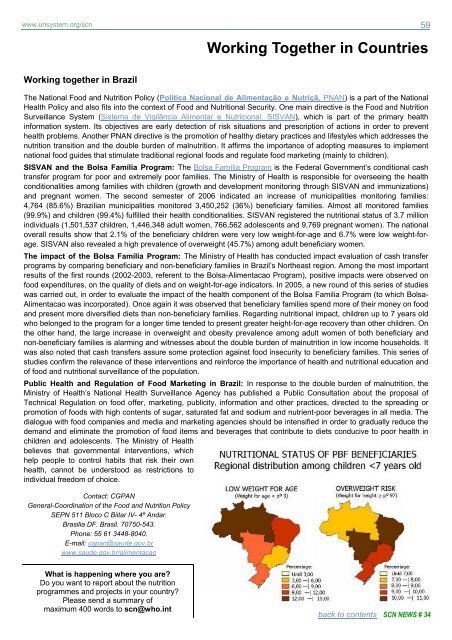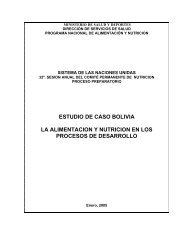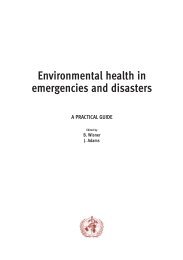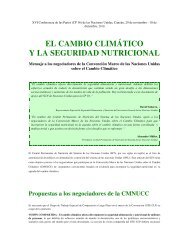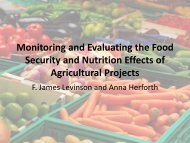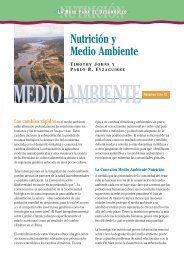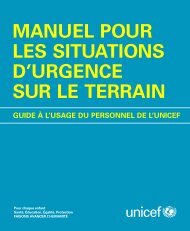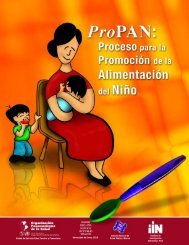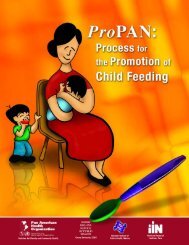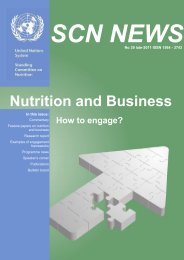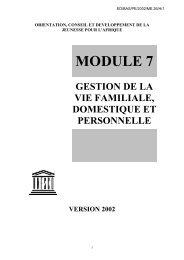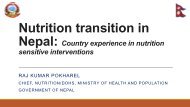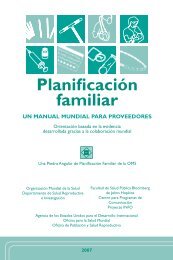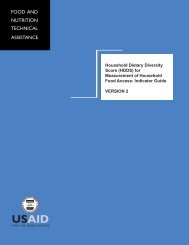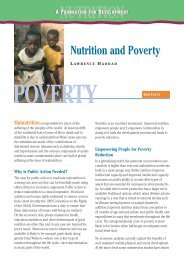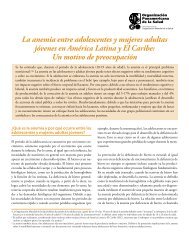SCN News No 34 - UNSCN
SCN News No 34 - UNSCN
SCN News No 34 - UNSCN
Create successful ePaper yourself
Turn your PDF publications into a flip-book with our unique Google optimized e-Paper software.
www.unsystem.org/scn 59<br />
Working Together in Countries<br />
Working together in Brazil<br />
The National Food and Nutrition Policy (Política Nacional de Alimentação e Nutriçã, PNAN) is a part of the National<br />
Health Policy and also fits into the context of Food and Nutritional Security. One main directive is the Food and Nutrition<br />
Surveillance System (Sistema de Vigilância Alimentar e Nutricional, SISVAN), which is part of the primary health<br />
information system. Its objectives are early detection of risk situations and prescription of actions in order to prevent<br />
health problems. Another PNAN directive is the promotion of healthy dietary practices and lifestyles which addresses the<br />
nutrition transition and the double burden of malnutrition. It affirms the importance of adopting measures to implement<br />
national food guides that stimulate traditional regional foods and regulate food marketing (mainly to children).<br />
SISVAN and the Bolsa Família Program: The Bolsa Família Program is the Federal Government’s conditional cash<br />
transfer program for poor and extremely poor families. The Ministry of Health is responsible for overseeing the health<br />
conditionalities among families with children (growth and development monitoring through SISVAN and immunizations)<br />
and pregnant women. The second semester of 2006 indicated an increase of municipalities monitoring families:<br />
4,764 (85.6%) Brazilian municipalities monitored 3,450,252 (36%) beneficiary families. Almost all monitored families<br />
(99.9%) and children (99.4%) fulfilled their health conditionalities. SISVAN registered the nutritional status of 3.7 million<br />
individuals (1,501,537 children, 1,446,<strong>34</strong>8 adult women, 766,562 adolescents and 9,769 pregnant women). The national<br />
overall results show that 2.1% of the beneficiary children were very low weight-for-age and 6.7% were low weight-forage.<br />
SISVAN also revealed a high prevalence of overweight (45.7%) among adult beneficiary women.<br />
The impact of the Bolsa Família Program: The Ministry of Health has conducted impact evaluation of cash transfer<br />
programs by comparing beneficiary and non-beneficiary families in Brazil’s <strong>No</strong>rtheast region. Among the most important<br />
results of the first rounds (2002-2003, referent to the Bolsa-Alimentacao Program), positive impacts were observed on<br />
food expenditures, on the quality of diets and on weight-for-age indicators. In 2005, a new round of this series of studies<br />
was carried out, in order to evaluate the impact of the health component of the Bolsa Familia Program (to which Bolsa-<br />
Alimentacao was incorporated). Once again it was observed that beneficiary families spend more of their money on food<br />
and present more diversified diets than non-beneficiary families. Regarding nutritional impact, children up to 7 years old<br />
who belonged to the program for a longer time tended to present greater height-for-age recovery than other children. On<br />
the other hand, the large increase in overweight and obesity prevalence among adult women of both beneficiary and<br />
non-beneficiary families is alarming and witnesses about the double burden of malnutrition in low income households. It<br />
was also noted that cash transfers assure some protection against food insecurity to beneficiary families. This series of<br />
studies confirm the relevance of these interventions and reinforce the importance of health and nutritional education and<br />
of food and nutritional surveillance of the population.<br />
Public Health and Regulation of Food Marketing in Brazil: In response to the double burden of malnutrition, the<br />
Ministry of Health’s National Health Surveillance Agency has published a Public Consultation about the proposal of<br />
Technical Regulation on food offer, marketing, publicity, information and other practices, directed to the spreading or<br />
promotion of foods with high contents of sugar, saturated fat and sodium and nutrient-poor beverages in all media. The<br />
dialogue with food companies and media and marketing agencies should be intensified in order to gradually reduce the<br />
demand and eliminate the promotion of food items and beverages that contribute to diets conducive to poor health in<br />
children and adolescents. The Ministry of Health<br />
believes that governmental interventions, which<br />
help people to control habits that risk their own<br />
health, cannot be understood as restrictions to<br />
individual freedom of choice.<br />
Contact: CGPAN<br />
General-Coordination of the Food and Nutrition Policy<br />
SEPN 511 Bloco C Biitar IV- 4º Andar.<br />
Brasilia DF. Brasil. 70750-543.<br />
Phone: 55 61 <strong>34</strong>48-8040.<br />
E-mail: cgpan@saude.gov.br<br />
www.saude.gov.br/alimentacao<br />
What is happening where you are?<br />
Do you want to report about the nutrition<br />
programmes and projects in your country?<br />
Please send a summary of<br />
maximum 400 words to scn@who.int<br />
back to contents <strong>SCN</strong> NEWS # <strong>34</strong>


